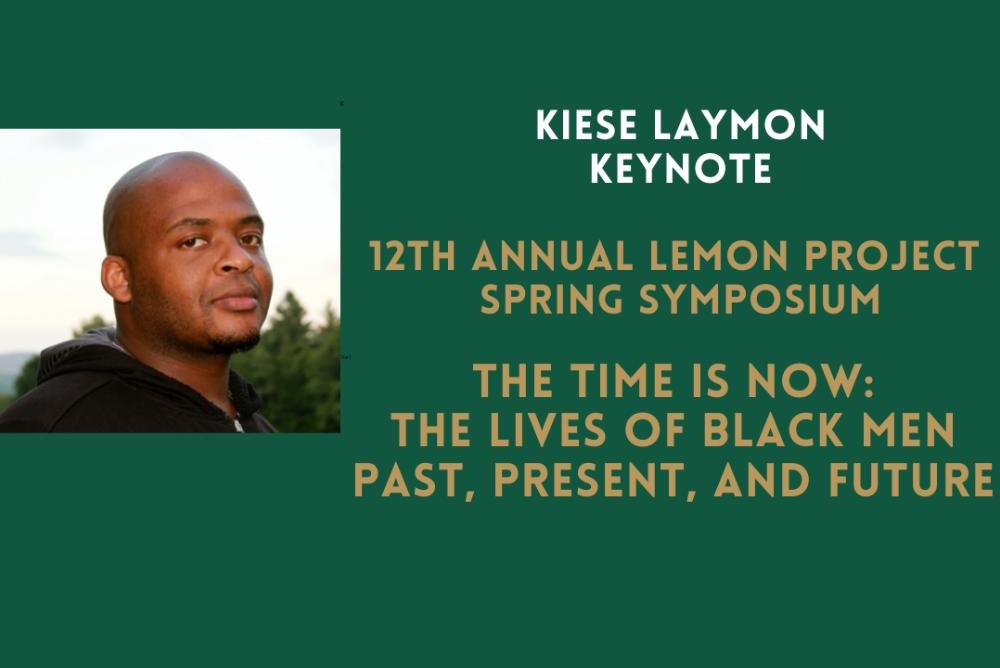W&M Featured Events
[PAST EVENT] Lemon Project Symposium Keynote with Kiese Laymon
Location
School of Education, In person at Matoaka or virtually over Zoom301 Monticello Ave
Williamsburg, VA 23185Map this location
Access & Features
- Open to the public
- Registration/RSVP

To join this event virtually, please click here. Registration is not necessary.
To join this event in person, please register here.
Kiese Laymon is a Black southern writer from Jackson, Mississippi. In his observant, often hilarious work, Laymon does battle with the personal and the political: race and family, body and shame, poverty and place. His savage humor and clear-eyed perceptiveness have earned him comparisons to Ta-Nehisi Coates, Alice Walker, and Mark Twain. He is the author of the award-winning memoir Heavy, the groundbreaking essay collection How to Slowly Kill Yourself and Others in America, and the genre-defying novel Long Division.
Laymon’s IndieBound bestselling memoir, Heavy: An American Memoir, won the 2019 Andrew Carnegie Medal for Excellence in Nonfiction, the 2018 Christopher Isherwood Prize for Autobiographical Prose, the Austen Riggs Erikson Prize for Excellence in Mental Health Media, and was named one of the 50 Best Memoirs of the Past 50 Years by The New York Times. A personal narrative that illuminates national failures, Heavy is defiant yet vulnerable—an insightful, often comical exploration of weight, identity, art, friendship, and family. In a starred review, Kirkus wrote, “Laymon skillfully couches his provocative subject matter in language that is pyrotechnic and unmistakably his own…. A dynamic memoir that is unsettling in all the best ways.” Heavy was named a best book of 2018 by the New York Times, Publishers Weekly, NPR, Broadly, Buzzfeed, The Washington Post, Entertainment Weekly. The audiobook, read by the author, was named the Audible 2018 Audiobook of the Year.
When Laymon was a contributing editor at Gawker, he wrote an essay called “How to Slowly Kill Yourself and Others in America.” This harrowing piece, which describes four incidents in which Laymon was threatened with a gun, evolved into a collection of lacerating essays on race, violence, celebrity, family, and creativity. How to Slowly Kill Yourself and Others in America “rarely smiles” and “never relents,” writes Oscar Quine in The Independent: “What this book really does brilliantly is elucidate the depreciated nature of a life lived as a Black American.” In 2020, Laymon released a revised and expanded edition which The New York Times raved “made a once solid collection superb…. Laymon [is] in full bloom as an artist and introspector.”
Laymon’s novel, the NAACP Image Award-winning Long Division, combines elements of science fiction, satire, and social commentary into a book that The Wall Street Journal, called “funny, astute and searching.” In Long Division, 14-year-old City, a newly minted YouTube star, is sent to stay with family in rural Melahatchie, Mississippi. What happens next transgresses the boundaries of fiction and reality, present and past, as City travels through time. Kirkus called it “hilarious, moving and occasionally dizzying,” and Booklist noted that Long Division “elegantly showcases Laymon’s command of voice and storytelling skill in a tale that is at once dreamlike and concrete, personal and political.” The novel was honored with the William Saroyan International Prize for Writing in 2014, and was shortlisted for a number of other awards, including The Believer Book Award, the Morning News Tournament of Books, and the Ernest J. Gaines Fiction Award.
Laymon is a contributing editor for Vanity Fair. His work has also appeared in The New York Times, Esquire, ESPN The Magazine, NPR, Colorlines, The Los Angeles Times, The Guardian, Ebony, Guernica, The Oxford American, Lit Hub, and many others in addition to Gawker. A member of Black Artists for Freedom, he was named to the Ebony Magazine Power 100 in 2015, and selected as a member of the Root 100 in 2013 and 2014. He is a graduate of Oberlin College and holds an MFA in creative writing from Indiana University. He founded the Catherine Coleman Initiative for the Arts and Social Justice, a program aimed at getting Mississippi kids and their parents, more comfortable reading, writing, revising and sharing. He is at work on several new projects including the long poem, Good God; the horror novel, And So On; the children’s book, City Summer, Country Summer; and the personal narrative about family and Mississippi, I Don’t Know What You Mean.
Contact
[[setho2, Sarah Thomas]]
